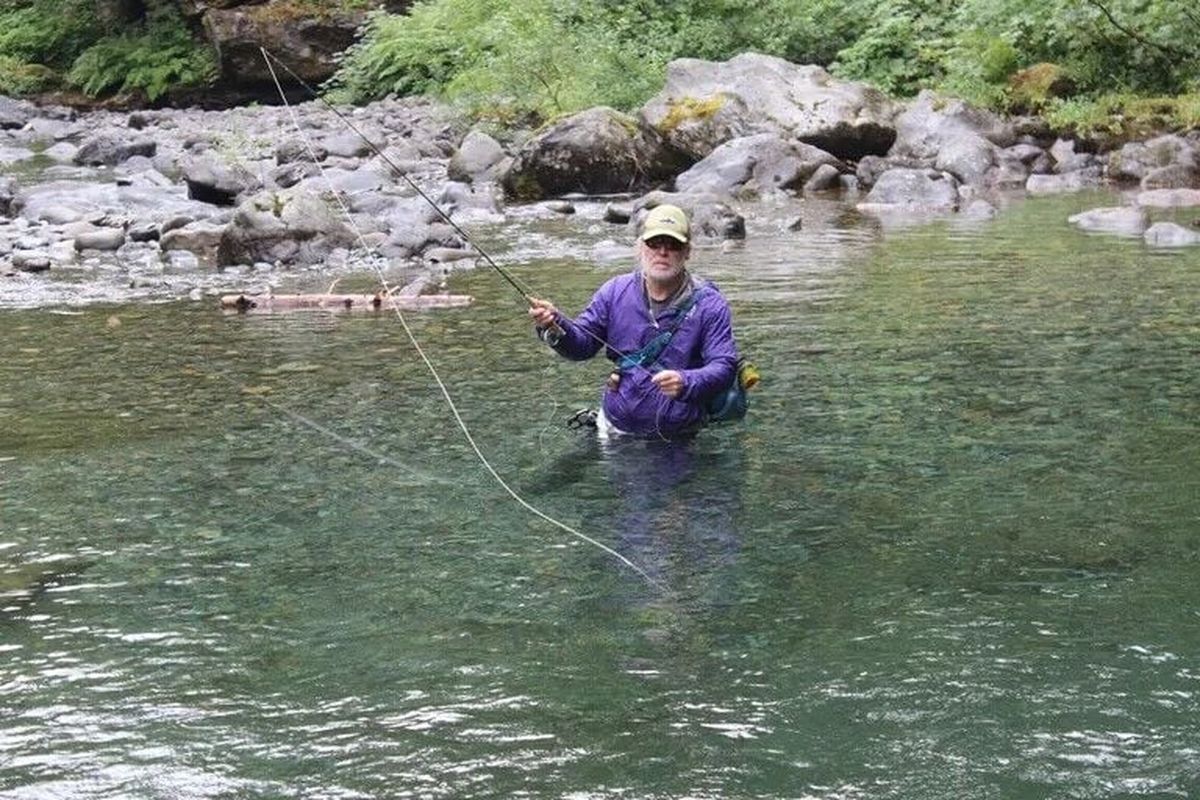In ‘River Songs,’ Steve Duda recounts fly-fishing joys and struggles

SEATTLE – After more than three decades of fly-fishing, Steve Duda still hasn’t lost his sense of childlike wonder.
Cupping a tiny cutthroat trout in his hands while wading in a Cascades stream earlier this month, he marveled at the creature’s orange scales before setting it free. The minuscule “cutty” is hardly the stuff of an epic battle of man versus fish. But that doesn’t matter.
What matters is stealing away from his West Seattle home on a Tuesday afternoon to explore the pools and falls of a pure mountain brook without seeing another soul, relying on decades of accumulated wisdom to intuit where a fish might lurk, finessing a cast into the perfect spot and smiling in satisfaction when the endeavor yields pay dirt.
Who cares if the fish is only a few inches long?
Duda, the head of Fish Tales at Patagonia and former editor of Flyfish Journal, has read plenty of Hemingway-esque angling stories over the years – and cultivated plenty of his own. As Duda recounts in his new book “River Songs: Moments of Wild Wonder in Fly Fishing” (Mountaineers Books, $24.95), that confluence of setting and skill drives his single-minded pursuit of fly-fishing.
Rather than puff his chest about his angling acumen, like the classic literature of this outdoor hobby, Duda offers funny, self-deprecating yarns and meditative reflections, riffing on the absurdity and beauty of chasing fish with a fly and a reel.
“Fly-fishing is a ridiculous activity filled with staggering amounts of failure, self-inflicted beatdowns and frustration,” Duda writes. “Yet, we soldier on, ignoring the sunburnt humiliations, shivering dunks and gale-force skunkings.”
As Duda demonstrated by landing three fish during our riverside interview, though, he and his fellow fly-fishing obsessives soldier on because, as he quotes in the book from a fishing buddy, “when you are out here and it’s so damned beautiful and you are grabbing trout … well, it just feels totally excellent to be really good at something.”
But anyone who sets down their rod to pick up a pen treads in hallowed water, and Duda was self-conscious about how he would insert himself into this rich literary tradition. Izaak Walton wrote arguably the first great fishing book, “The Compleat Angler,” in the 17th century, while “Moby-Dick” still enthralls high school students nearly 175 years after its publication. Ernest Hemingway’s “The Old Man and the Sea” won a Pulitzer, while Norman Maclean’s “A River Runs Through It” was nominated for one.
“I didn’t want to write hero stories,” Duda told me from the tailgate of his battered 1999 Ford Ranger, a key character in the book. “There are a lot of cliches about one man battling a fish. No one’s interested in how good of a fisherman I am.”
Instead, you get chapters like “Sir Longballs,” a vulnerable piece about frontier-style dentistry and surgical procedures to address middle-aged male health concerns. These episodes highlight Duda’s approach to writing about his chosen sport.
“Fly-fishing is about camaraderie, friendship and the moments in between fish,” he said. “What struggles do we confront? What struggles do we overcome? What do we take away from the experience?”
In this more confessional approach, Duda joins the burgeoning new school of fly-fishing prose, many of whose finest practitioners are based in Washington, like Dylan Tomine, Langdon Cook, Amanda Monthei and Anne Landfield. (Catch them at the roving live authors and artists series Writers on the Fly, founded by Jason Rolfe, Duda’s successor at Flyfish Journal.)
Turning the pages back nearly 40 years, Duda owes his passion to a magazine, an alt-weekly and a generous pawnshop broker.
Raised in Michigan, he gravitated to the punk scene and printed his own zines. But flipping through Outside magazine in the late 1980s propelled him to Boise, declared that year’s “best city” by the outdoorsy print monthly, where he landed a job as founding editor of the Boise Weekly. Duda’s publisher introduced him to fly-fishing, and he lucked out when the proprietor of a pawnshop agreed to part with a rod for $50 – all Duda had in his pocket. When he arrived in Seattle in 1993 to further his journalism career, Duda brought the rod and flies.
Three decades later, “River Songs” joins the storied literature of fly-fishing from a distinctly Washington perspective. There are chapters about the biennial frenzied pink salmon run in Puget Sound, the end-of-season bacchanal on the Yakima River known as Burning Pram and how the history of Columbia River dams has yielded a copious amount of carp.
Like any respectable fly-fisher, Duda also roams far and wide in search of the perfect place to cast.
Memorable scenes include Duda’s amusing mock application form for Washington state unemployment benefits before disappearing into Yellowstone National Park, his escapades evading crocodiles and tourist traps in Belize, and an ornery horse high in the Montana mountains.
His adventures in Argentine Patagonia provide amusing anecdotes of etiquette lost in translation – like his American fishing companion mistaking a lodge’s grill as a clothes-drying rack for his underwear – and moments that transcend languages barriers, like the universal superstition that bananas in a boat are bad luck.
Then there are the book’s experimental, quasi-poetic vignettes, like “Steelhead as a Fragrance” (“… sage, salami, scotch, skunk, sleet, snow, spit, stale beer, sweat, sweetgrass …”) that aren’t far off from the bawdy spirit of the commercial fishing scene’s annual FisherPoets Gathering in Astoria, Oregon.
But above all, Duda said, “the overriding theme of the book is wonder.”
“We get to go to beautiful places and see the best parts of nature,” he said. “If we’re lucky, we get to hold one of its most exquisite creatures in our hands – even if it’s just for a moment, we get to touch that magic.”